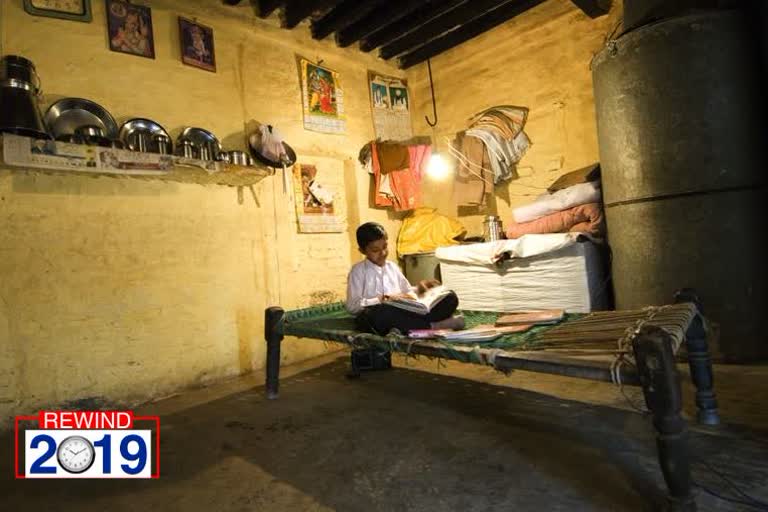New Delhi: The government will have to do a tight ropewalk as it pursues a target of 24x7 electricity for all, and also attract investors in a sector where state power distributors continue to be in the intensive care unit (ICU) amid slipping demand.
The agenda for the year 2020 is well laid out- launch of UDAY 2.0, installation of smart pre-paid metres, prompt payment by discoms, making coal available for short term and reviving gas based plants.
However, the government has been on the mark so far as it took slew of measures to bring sector out of woods. But, it has to ensure effective implementation of various policy tweaks done so far and to do left out task especially for gas-based stranded power projects in the country.
Talking to PTI, Power Minister R K Singh said, "Now, we have taken a series of steps to make the power sector sustainable in India. We made India a power surplus and unified the whole country in one grid".
"We connected every village and every house with electricity in India. We have implemented IPDS (integrated power development scheme) and Deen Dayal Gram Jyoti Yojna to make sure that the distribution faults are solved out. We have put in place regulatory mechanisms to ensure a 24X7 supply for all. And at the same time, we are sort of changing our generation mix and reducing our carbon footprints," he said.
However, the power sector industry bodies are of the view that there is an urgent need to address the issues of burgeoning outstanding dues of discoms toward generators and stressed projects are being dragged under insolvency proceedings.
Director General of Independent Power Producers Association of India Harry Dhaul told PTI, "Now the stressed power projects are facing insolvency proceedings. But the stress is also caused by non-payment by discoms. All those projects which have sizeable outstanding of discoms towards them, should not go for distress sale under NCLT (National Company Law Tribunal)".
According to PRAAPTI (Payment Ratification And Analysis in Power procurement for bringing Transparency in Invoicing of generators) portal, the discoms' total outstanding dues to power gencos rose 48 per cent to Rs 81,010 crore in October.
Read more:World's cheapest, biggest telecom market faces life-threatening crisis
In October this year, the total overdue amount, which was not cleared even after 60 days of grace period offered by generators, stood at Rs 67,143 crore as against Rs 39,338 crore in the same month last year.
Power producers give 60 days to discoms for paying bills for the supply of electricity. After that, outstanding dues become overdue and generators charge penal interest on that in most cases.
Director General of Association of Power Producers Ashok Khurana told PTI, "The main issue is that discom pay promptly. If a power generator has sold power then their dues should be paid".
In order to give relief to power generation companies (gencos), the Centre enforced a payment security mechanism from August 1. Under this mechanism, discoms require open letters of credit for getting power supply.
Besides there is a provision for single day purchase on advance payment.
Now, the new version of UDAY 2.0 is expected to bring ray of hope for stressed power sector.
The government had launched Ujwal DISCOM Assurance Yojana (UDAY) November, 2015, which was aimed at financial and operational turn around of power distribution utilities (DISCOMs) of the country.
According to UDAY portal, 16 states issued bonds worth Rs 2.32 lakh crore to reduce financial burden of discoms against targeted Rs 2.69 lakh crore.
It also showed that as many as 25 states' aggregate technical and commercial losses are 21.09 per cent. The government intended to bring these losses to below 15 per cent level.
Tariff revision was done by 25 states out of 27 states opted for the scheme. The date of 25 states show that there is gap of Rs 0.34 between average cost of supply and average rate of realisation.
The indicators clearly show that there has been improvement on discoms performance but a lot of ground still need to be covered.
Singh has told PTI, "We are changing the way the power sector works. There will be no late-payments or load shedding in the coming days. Earlier, there used to be fault metering, announcement of free electricity. But now, we are closing all the ends. We have asked states to use DBT (direct benefit transfer) system if anyone wants to provide free electricity, the benefit will be directly transferred to the consumer.
"We have taken another step to improve the system by asking for pre-payments, now that will lead to lesser costs, lesser tariff because of carried costs have been done away with. We have also brought down a pre-payment system for discoms. By and large, Today every discoms either choose LC or advance payment, they don't have any other option."
On using technology to deal with issue of delayed payments by discoms, he said, "Soon, we will replace every meter with smart meters. After 3 years, the power sector will be completely different and sustainable and the demand will increase. Also, the investment will come as they will have confidence that the payment will come".
The next challenge for the government will be revival of gas-based power plants - 14305 MW of generation capacity remains stranded for want of fuel. The challenge is inadequate domestic gas production and costlier imports. Is there a solution to the problem, 2020 may hold cue to that.



